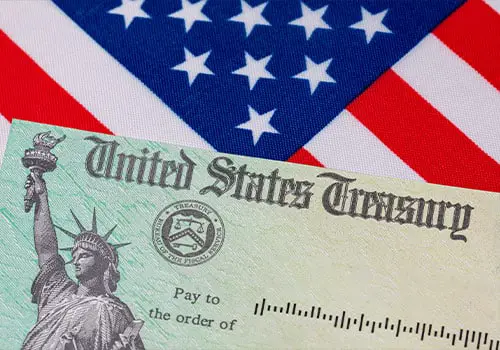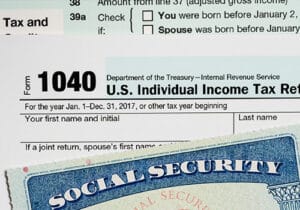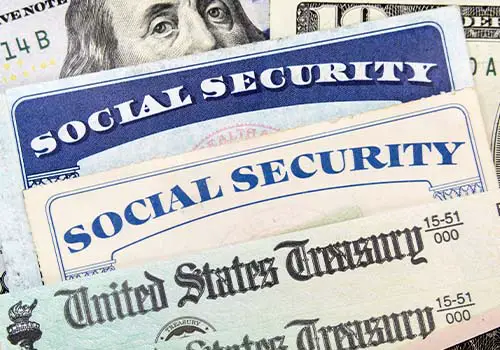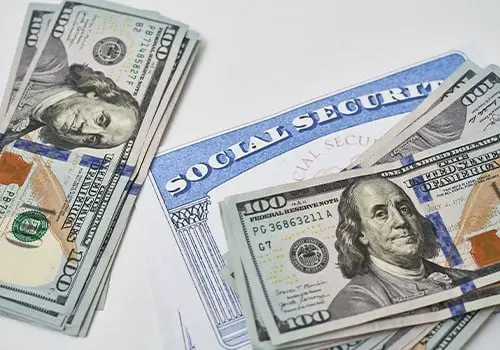The word socialism can start some heated debates between many Americans. It has been a hot topic in recent years, and many wonder if America is headed toward a more socialist form of government. Most people agree that capitalism is at the heart of the “American dream,” although there is some argument on whether there are already some socialist programs in the US.
Is one of those programs Social Security? To answer that question, you need first to understand socialism and then examine the Social Security program itself. We can all agree that millions of Americans depend on their Social Security benefits, so the program must continue whether these benefits qualify as socialism or not.
What Is Socialism?
Many people seem to have their own ideas about socialism, but what is the true definition of socialism? Merriam-Webster defines socialism as “any of various economic and political theories advocating collective or governmental ownership and administration of the means of production and distribution of goods.” It goes on to state that there is no private property ownership in socialism.
This is in direct contrast to capitalism. In capitalism, private individuals or companies own goods and means of production and pay workers a wage to produce those goods. They can then sell those goods to consumers for a profit. You might also hear capitalism called…” a free market system.”
Utopian Society
Socialism is often thought of as a Utopian society where everyone shares equally. Everyone is expected to perform some level of work, and in turn, the government distributes the wealth equally to all its citizens. Socialism requires a high level of government control to manage the wealth and resources of the country and provide for the citizens. Socialism sounds great in theory, but it does have some devastating flaws.
Variations of Socialism
Capitalism drives innovation and hard work, while socialism provides no real reward for working harder than others or developing new ideas. Since everyone shares equally, there is no incentive to work. Several countries today have some form of socialism present in their government. On one end of the spectrum, communist countries like China and Vietnam are almost entirely controlled by their government.
However, countries like France and Germany are considered democratic socialist governments. They allow private ownership of property, but the government provides some essential services for free and advocates for the redistribution of wealth.
US Socialistic Endeavors
With the passage of the Affordable Care Act, some Americans started believing the country was headed toward a socialist economic system. This view continues as economic stimulus payments were sent out due to the Coronavirus outbreak during Donald Trump’s presidency and President Joe Biden’s. Some even view public schools as a form of socialism because the government runs them. However, make no mistake: America’s private sector is alive and well today.
Libertarian Shift
The Libertarian Party has gained popularity recently, so how do they fit in? Their views are typically in direct contrast to socialism. Libertarians favor personal responsibility and small government. They prefer that the government stay out of things as much as possible, while socialists want it to control almost everything. Now that you understand socialism and how it works, we can dive deeper into Social Security to determine whether it is a socialist program.
KEY TAKEAWAYS
- Social Security is not Socialism in its truest form, though certain elements have a form of democratic socialism.
- The US government requires that everyone (with a few exemptions) pay into the Social Security program, and they dictate the retirement benefits you will receive.
- Over the years, the Social Security program has expanded and now includes more than just retirement benefits. You can now receive survivor and disability benefits.
Who Is Running The Social Security System?
Here is how the Social Security system works: The federal government runs Social Security. While technically, the Social Security Administration runs the program, this agency was set up by the federal government, and all its authority comes from the government.
The SSA does contract with some private companies to perform certain services, but overall, the government runs the system. This applies to retirement benefits and disability benefits alike. Many confuse food stamps with Social Security, but the U.S. Department of Agriculture administers that program.
History of Social Security
Social Security was established in 1935 and signed into law by President Franklin D. Roosevelt (FDR). At the time, the country was in the midst of the Great Depression, and many retirees had no way to provide for themselves or their families. The first taxes were collected in 1937, and the first payments went out soon afterward – just before the start of World War II.
The idea for the system came from 19th-century Germany, which established the old-age insurance program to help prevent the implementation of some socialist ideas.
Medicare + Social Security
Fast-forward to America today, and the government still fully manages the Social Security program, which includes health insurance. You often hear the government programs Medicare and Medicaid referred to together, but Medicaid is not associated with Social Security. Medicare, on the other hand, is the health care provided as part of this social insurance program.
The government mandates that a certain percentage of your earnings be paid toward these programs, and taxpayers have no choice. Many people wonder, “Is Medicare socialism?” Although it may be a social program, at its essence, it is not pure socialism.
Who Decides How Much Social Security You Will Receive?
Retirement Benefit Formula
Many people wonder how much Social Security will pay when it is time to start reaping the rewards of all those years paying into the system. Again, the government decides how much you will receive from the program when it is time to receive your benefits. Retirement benefits are based on your earnings during your lifetime, and there is a formula to determine how much you will get after retirement. The government developed the formula, which is quite complicated for most people. Regardless of your income, there is a maximum amount that you can receive in benefits.
Social Security Disability Insurance (SSDI)
Regarding disability insurance, the formula is a little more of a secret. It is nearly impossible to determine precisely how much you will receive in disability benefits should the need arise for you to use those. The calculation is still based on your past earnings and work history, but it seems that no one knows precisely how to calculate the exact number. There is a limit to how much you can receive, and the average payment for SSDI benefits in 2024 is $1,537 per month.
Must read articles related to Social Security
- Complete guide to the ins and outs of Social Security.
- How did the Social Security program get started?
- What is the future of Social Security…will it run out?
- Eight ways to maximize your Social Security benefits.
- Best Social Security strategies for married couples.
Can You Opt Out Of Paying For Social Security?
Many people would prefer to save money for retirement alone without the government telling them exactly how much to put away. They also do not want to depend on the government for their retirement income, so they prefer to opt out of the system and not participate. Unfortunately, that is not an option. In general, you cannot opt out of paying Social Security taxes. There are a few minor exceptions to this rule.
Religious Exemption
Specific religious organizations can claim a religious exemption from paying these taxes. The Mennonites and Amish are religious groups that often opt out of the system. However, other specific requirements must also be met to opt out.
- You must not only claim a religious objection, but you must also waive your right to receive benefits from the program.
In addition, you may be required to prove that you have never received any benefits from the program. If you have received previous benefits, then you will be required to repay those before being allowed to opt out of future participation in the program.
Other Specific Exemptions
There are a few other exemptions as well that we will briefly discuss. Foreign government employees working in the United States are not required to participate, nor are college students who work for their school or university. Some non-resident aliens are not required to pay into the system, and people who renounce their U.S. citizenship can opt out.
Again, opting out of the system also prevents you from receiving benefits in the future. You cannot have your cake and eat it too, i.e., you cannot choose not to pay into the system and then receive its benefits later in life.
TIP
Social Security was not designed to be the sole source of income for retirees. Investing in private retirement plans like IRAs and 401ks provides additional retirement income and flexibility.
Do I Still Need A Private Retirement Account?
Since you are required to pay into Social Security, many people wonder whether they still need a private retirement account. The consensus is yes! In many cases, the amount that retirees receive from their Social Security retirement benefits is barely enough to cover their basic living expenses. Saving money in a private account like a 401(k) or IRA is still necessary. In addition, private accounts have many advantages over the government system.
Contribution & Distribution Flexibility
First, you choose how much money you contribute to your retirement account. You can choose to save more and retire early if you wish. You also decide how much money you withdraw from your retirement accounts. This contrasts with Social Security, where the government determines your benefit amount, and you cannot change it.
Lastly, you have greater flexibility around when you can receive your benefits. You may choose to start receiving your benefits sooner or wait until later to receive them. Your options are much more wide open when using private accounts.
Additional Income
In addition to the abovementioned things, saving money in a private account also helps ensure you have enough money to live comfortably. Since Social Security is only fully funded until around 2035, it might begin to run out around that time. Benefits might have to be cut after that. Many Americans feel that they will end up receiving no benefits at all from the system.
Congress will need to make some changes to the program to keep it running, although no one knows what those changes look like. Republicans and Democrats tend to disagree on what those changes should be. The American people do not like hearing about any cuts to the program, but some changes are inevitable in the coming years.
The Bottom Line
After hearing all the facts, it is evident that Social Security is, at the very least, a form of democratic socialism. The program is mandatory, and the government wholly runs it. The government decides how much you must contribute to the system and determines how much you will receive from the system in benefits.
While it may not be on the same level as the socialistic views pushed by some politicians like Bernie Sanders, it indeed contains aspects of socialism. That being said, it has become an accepted social program within the country and is likely not going away soon.
Too many people rely on the system, and eliminating it could have dire consequences. It will be interesting to see how the system evolves over the coming years, but it is almost certain that it will not disappear.
Frequently Asked Questions
Many ask, “Is Social Security a socialist program?” One of the key differences between the two is that you must qualify for Social Security benefits. While the government does administer the system, it is funded by individuals and employers. You must have paid into the system to receive benefits from the system. If you do not have the proper work history and have not paid the taxes, you will not be eligible for payments from the program upon your retirement.
This differs from socialism because, in a pure socialist scenario, the government provides for everyone. There is no need to qualify for the program. The government provides the funds, and it distributes them to all the citizens as it sees fit. Social Security is simply a social program that is administered by the government, though it is funded by private citizens. Though Medicare may receive some government subsidies, most of the costs are paid by taxes from private citizens and companies.
Payment of the OASDI tax is simple, and you do not even have to worry about it if you work for a company. This tax is automatically withheld from your earnings and remitted to the IRS on your behalf by your employer. Your employer also pays the same amount as you – 6.2% each for 12.4% total tax.
If you are self-employed, things are a little different. The tax is not automatically withheld from your earnings, so you will need to pay the tax when you file your tax returns each year. In addition, you’ll be required to pay both the employee and employer portions of the tax.
While socialism sounds excellent in theory, it has some problems. First, it tends to stifle innovation because individuals have no incentive to work harder. If everyone receives the same wealth from the government, people tend only to do enough to get by.
Many people also distrust the government and do not want to rely on it for their basic needs. Sometimes, government officials become power-hungry and begin keeping things for themselves while their citizens go without. In extreme cases, this eventually leads to communism, and the citizens no longer have a voice in the country’s leadership.
You can find a Social Security Administration office near you by using our SSA office locator and searching for your closest location.







